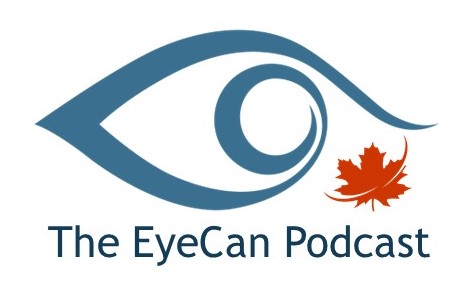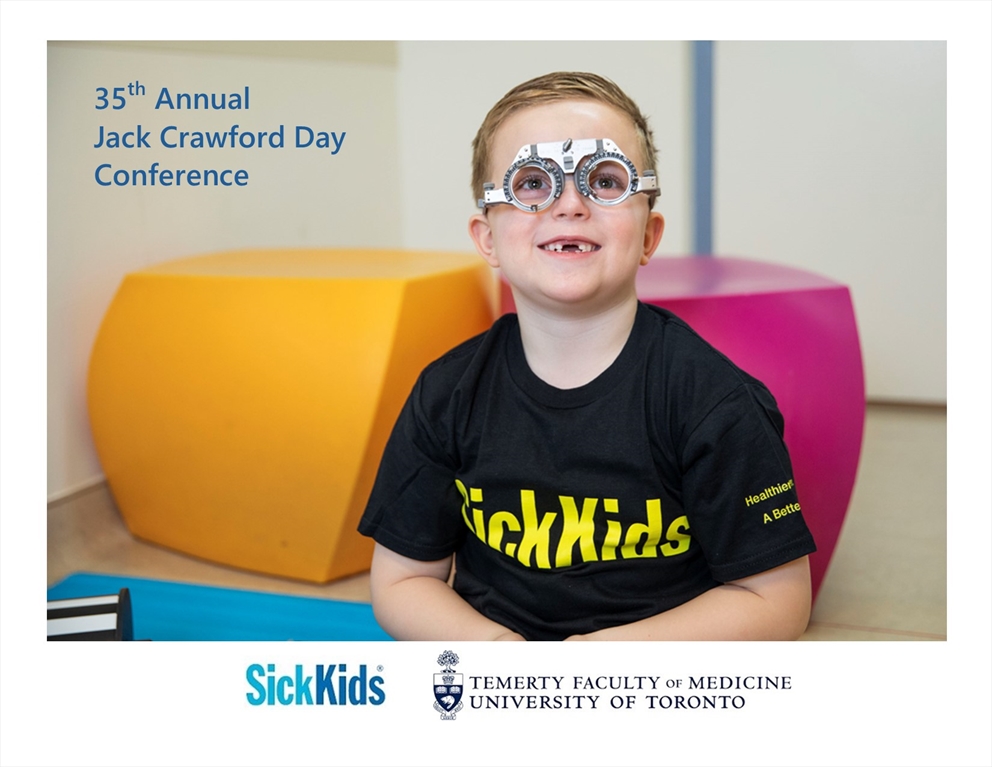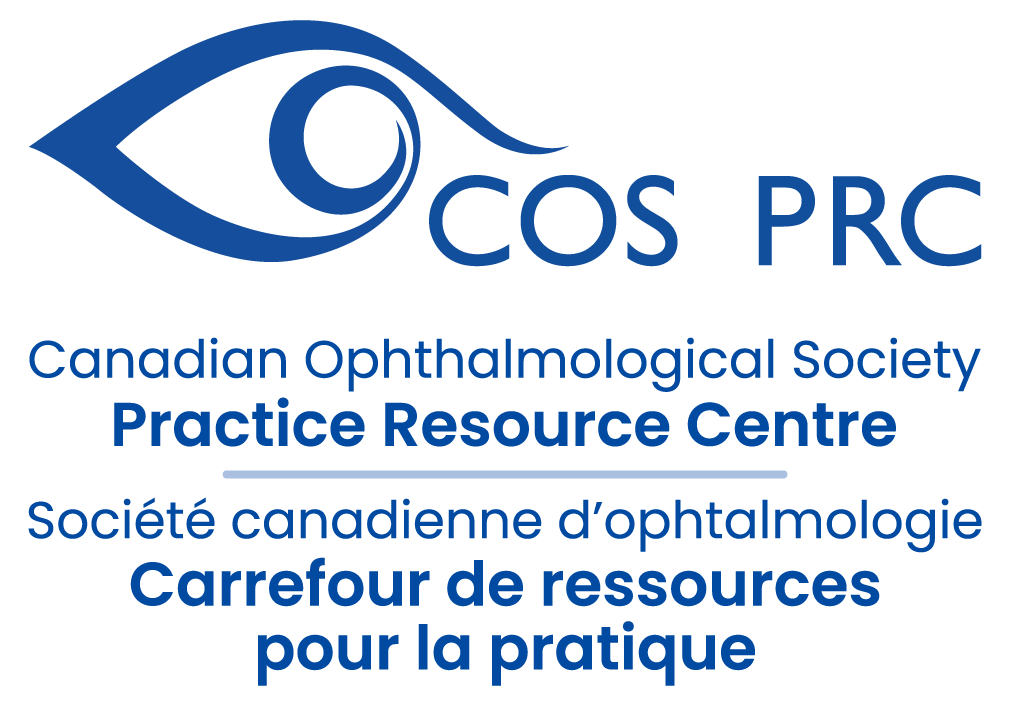COS – THE EYECAN PODCAST- New Season!

The podcast features guest speakers from across Canada and innovative practitioners from around the world discussing diverse topics and how they impact ophthalmology. Topics range from emerging techniques and technologies to building individual resilience as Canadian physicians. Through it all, this podcast aims to build connections within the ophthalmological community, share our experiences, and to truly promote the value the profession brings to the lives of patients.
Click here to listen on Apple Podcasts
Click here to listen on Spotify
Click here to listen on COS Media Player
Ocular Mucous Membrane Pemphigoid Course
Location: Virtual – access the course HERE
Mucous membrane pemphigoid (MMP) is a cicatricial autoimmune disease primarily affecting mucous membranes of the conjunctiva, oral cavity, nasopharynx, oesophagus and genitals. Ocular involvement occurs in approximately 80% of cases, highlighting the importance of early diagnosis to prevent irreversible damage and potential blindness.
Authors: Melissa Lu (MD), Fady Sedarous (MD, FRCSC), Mona Harissi-Dagher (MD, FRCSC)
Learning objectives: Upon completion of this module, learners will gain a comprehensive understanding of the pathophysiology, clinical signs, diagnostic and treatment principles of ocular mucous membrane pemphigoid (OMMP), enabling them to apply this knowledge in clinical practice.
Target audience: Ophthalmology residents and ophthalmologists.
Joint Position Statement on Plasma Technology for Blepharoplasty and the Role of Social Media in Cosmetic Procedures
The Canadian Ophthalmological Society (COS) and the Canadian Society of Oculoplastic Surgery (CSOPS) are dedicated to ensuring the highest standards of patient care and professional practice within the fields of ophthalmology and oculoplastic surgery. The growing use of plasma technology in blepharoplasty and its promotion through various media, including social media influencers, calls for clear guidance and information for both our members and the public. The joint position statement is available to read below:
To access the French version, click here | Pour accéder à la version française, cliquez ici
35th Annual Jack Crawford Day Conference

Join your fellow members of the U of T and SickKids Ophthalmology and Vision Sciences communities for a full day of professional development and networking opportunities. This conference honours the late Dr. Jack S. Crawford, former Ophthalmologist-in-Chief for the Hospital for Sick Children, whose career was dedicated to advancing the specialty of pediatric ophthalmology and the care of children’s eye problems.
The 35th Annual Jack Crawford Day will focus on the theme “Every Angle, Every Child: Recent Advances in Kinder Eye Care.” The day will include topics relevant to both pediatric and general eye specialists including pediatric refractive surgery, intrascleral fixation IOL in children with zonular deficiency, minimally invasive glaucoma surgery in children, tips and pearls from 42 years in strabismus practice, 2025 PEDIG updates, virtual reality perimetry, anti-VEGF and systemic implications for ROP, pneumatic retinopexy and a few more
Date: April 4th, 2025 from 8:00 AM – 4:00 PM (E.T)
Location: The Peter Gilgan Centre for Research and Learning Auditorium in Toronto, ON (686 Bay Street)
Speakers: Drs. Sean Donahue, Manoj Parulekar and Stephen Kraft
In-person and online registration is available for this event.
For more information, such as registration, click HERE.
2025 Federal Election Members Advocacy Toolkit
For the French version, follow this link | Pour la version française, suivez ce lien – https://www.cosprc.ca/fr/trousse-de-sensibilisation-des-membres-elections-federales-de-2025/
Workplace Eye Awareness Month: Protecting Vision in Professional Environments
Submitted by: Yosra Er-reguyeg

March is Workplace Eye Awareness Month, dedicated to promoting eye health and safety in professional settings. With over 700 work-related eye injuries occurring daily in Canada, protecting vision is a critical aspect of workplace safety. This PRC issue provides an overview of common workplace hazards and protective strategies; as well as a list of national resources to help providers promote workplace eye safety and awareness among patients.
Common Workplace Eye Hazards
- Flying Particles and Debris: metal shavings, wood splinters, dust, and other airborne materials can cause corneal abrasions or penetrate the eye, leading to severe damage.
- Chemical Exposure: industrial and healthcare professionals risk chemical burns from splashes and airborne vapours.
- Radiation Exposure: welders, laboratory workers, and those using high-intensity light sources face ultraviolet (UV) or infrared radiation risks, which can damage ocular tissues.
- Digital Eye Strain: office workers experience Computer Vision Syndrome due to prolonged screen use, leading to dryness, discomfort, and headaches.
- Infectious Disease Exposure: healthcare workers are at risk of eye infections from bloodborne pathogens or airborne contaminants.
Eye Protection Guidelines in Canadian Workplaces
- Usage of Canadian Standards Association (CSA)-certified protective eyewear: all protective eyewear in Canada must meet CSA Z94.3 standards to ensure impact resistance, UV protection, and durability.
- Prevention of digital eye strain in office settings: follow the 20-20-20 rule: every 20 minutes, take a 20-second break and look at something 20 feet away. Optimize your workstation by adjusting screen brightness, ensuring proper lighting, and positioning the monitor at eye level.
- Anticipation of workplace eye injuries: emergency eyewash stations should be easily accessible in workplaces handling chemicals and patients should seek medical evaluation as soon as possible.
Vision Care and Occupational Health Policies in Canada
- Many Canadian employers provide vision care benefits, but only15% of employees report satisfaction with their coverage.
- Occupational Vision Programs across Canada provide prescription safety eyewear to employees in industries requiring eye protection.
- Regular comprehensive eye exams can detect early signs of workplace-related vision issues and are encouraged by the Canadian Ophthalmological Society.
Workplace eye safety is essential for preventing injuries and long-term vision issues. Recognizing Workplace Eye Awareness Month is an opportunity to reinforce best practices and ensure clear vision for a productive workforce.
Resources on workplace eye safety
- CCOHS H&S Report (2014) – Use of CSA-approved eyewear and matching PPE to hazards ( CCOHS: Health and Safety Report – Past Issues ) ( CCOHS: Health and Safety Report – Past Issues ).
- Canada.ca – Protect Your Eyes! – qualities of good protective eyewear and care tips (Protect Your Eyes! – Canada.ca) (Protect Your Eyes! – Canada.ca).
- Canadian Association of Optometrists – reports ~75% of Canadians have digital eye strain symptoms (How Long Does Eye Strain Last? | Cochrane, AB).
- CCOHS – Office Ergonomics: Eye Discomfort – causes of screen-related eyestrain ( CCOHS: Office Ergonomics – Eye Discomfort in the Office ).
- CCOHS H&S Report (2019) – tips to prevent digital eye strain (20-20-20 rule, breaks, ergonomics) ( CCOHS: Health and Safety Report – Past Issues ) ( CCOHS: Health and Safety Report – Past Issues ).
- Benefits Canada (2022) – survey of remote workers’ increased eye issues (As employees’ screen exposure increases, is it time to update vision benefits? | Benefits Canada.com).
- CNIB – “In the Blink of an Eye…Avoiding Eye Injuries” – first aid tips for specks, blows, cuts, chemical splashes (In the blink of an eye … Avoiding eye injuries at work, home and play) (In the blink of an eye … Avoiding eye injuries at work, home and play).
- CCOHS – First Aid for Chemical Exposures – flush eyes ≥15 minutes for chemicals ( CCOHS: First Aid for Chemical Exposures ). CCOHS H&S Report – importance of eyewash stations ( CCOHS: Health and Safety Report – Past Issues ).
- Canadian Association of Optometrists – Best Practices Guide to Vision Benefits (2022) – stats on vision benefit satisfaction and missed work due to vision issues (Best Practices Guide to Vision Care Benefits) (Best Practices Guide to Vision Care Benefits).
- Canadian Ophthalmological Society – press release 2021 – urging regular eye exams (Canadian Ophthalmological Society shares eye-opening stats and tips for healthy vision during Vision Health Month – COS-SCO).
- Eyesafe BC (Doctors of Optometry) – overcoming barriers to PPE compliance with prescription safety eyewear (Eye Injury Statistics: Why Workers Won’t Use Safety Glasses – Eyesafe BC by British Columbia Doctors of Optometry) (Eye Injury Statistics: Why Workers Won’t Use Safety Glasses – Eyesafe BC by British Columbia Doctors of Optometry).
Low Vision Rehabilitation Journal Club – VIA ZOOM
The Department of Ophthalmology and Vision Sciences at the University of Toronto would like to extend an invitation to you, your colleagues, fellows, residents and students to join them in the Low Vision Rehabilitation Journal Club.
Date: Wednesday, March 26th, 2025
Time: 7:30 – 8:30 PM ET
Topic: Neuroplasticity in vision rehabilitation
Speaker: Drs. Ghaliah Nsour and Sangeetha Santhakumaran
Learning Objectives:
- To discuss the new scientific evidence of brain plasticity through increase of cortical activity provoked by biofeedback training on the microperimeter;
- Home-training of direction discrimination in cortically blinded fields as a benefit against the transsynaptic retrograde regeneration post-stroke.
To register in advance for this webinar, click HERE.
The VPP Grand Rounds Local and Visiting Professor Program is a self-approved group learning activity (Section1) as defined by the Maintenance of Certification program of The Royal College of Physicians and Surgeons of Canada. This activity is accredited for Section 1 MOC credits. You may claim a maximum of 1 hour.
Webinar: Strengthen Your Advocacy Skills Ahead of the Federal Election

COS is pleased to provide this Advocacy and Government Relations webinar for the upcoming Federal Election. This event is being offered exclusively to COS members and Residents.
We are living in unprecedented times—facing evolving healthcare challenges, an aging population, and a rapidly changing political landscape. With the upcoming federal election serving as a pivotal moment for Canadians, this is a unique opportunity to unite in shaping the future of vision health and ophthalmology.
Join us on Wednesday, April 16, 2025 at 7:00 PM ET for an accredited webinar designed to equip you with the skills and key messages needed to advocate effectively with local and provincial policymakers. Your voice is critical in ensuring that ophthalmology and vision health remain a priority on the national agenda.

Dr. Ahuja leads the COS Advocacy Council and advises the Board of Directors on COS’ advocacy and government relations initiatives. She recently developed a framework for implementing Canada’s National Eye Care Strategy, along with other key submissions to the federal government.

Brett Hartley is a seasoned government relations professional with a deep passion for Canadian politics, public policy, and relationship-building. With over a decade of political experience, including significant time on Parliament Hill, he has worked closely with municipal, provincial, and federal officials to drive impactful initiatives and deliver meaningful results for both policymakers and clients.
By the end of this webinar, you will be able to:
- Understand how to effectively communicate key issues to government officials and policymakers
- Learn best practices for securing and conducting successful meetings with elected officials
- Gain insights into the current political landscape and how it affects our ophthalmology profession
DOVS CORNEA ROUNDS – No Sutures, No worries: Mastering Flanged Scleral Fixation – VIA ZOOM
Date: Thursday, March 27th, 2025
Time: 5:00 – 6:00 PM (Eastern Standard Time)
Title: No Sutures, No worries: Mastering Flanged Scleral Fixation
Speaker: Professor Adi Einan Lifshitz
Zoom Link: Register in advance for this webinar
After registering, you will receive a confirmation email containing information about joining the webinar.
Objectives:
1. Understand the Principles and Indications for the Flange scleral fixation technique Master the Surgical Steps;
2. Recognize Complications, Postoperative Care and tips for success.
The VPP Grand Rounds Local and Visiting Professor Program is a self-approved group learning activity (Section 1) as defined by the Maintenance of Certification program of The Royal College of Physicians and Surgeons of Canada. You will be able to claim 1 credit for this round.



